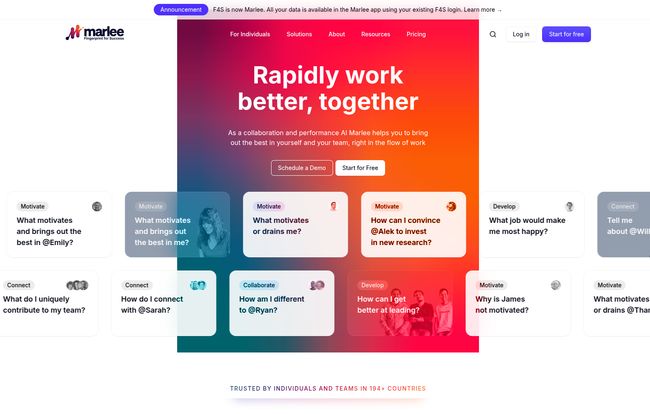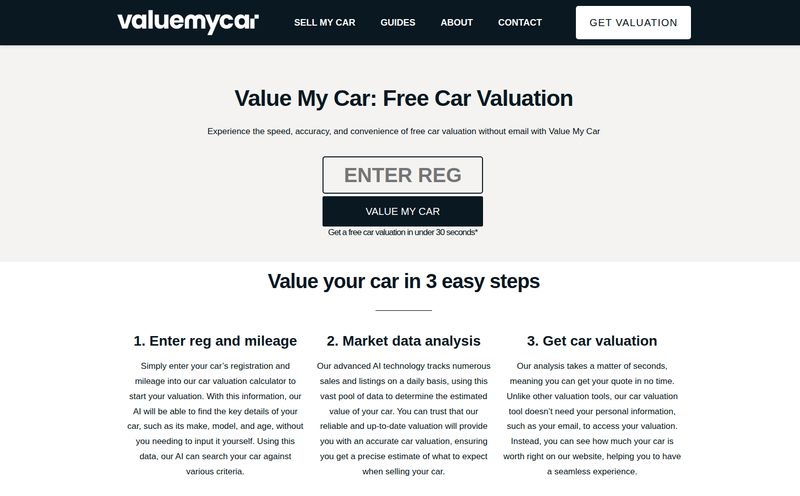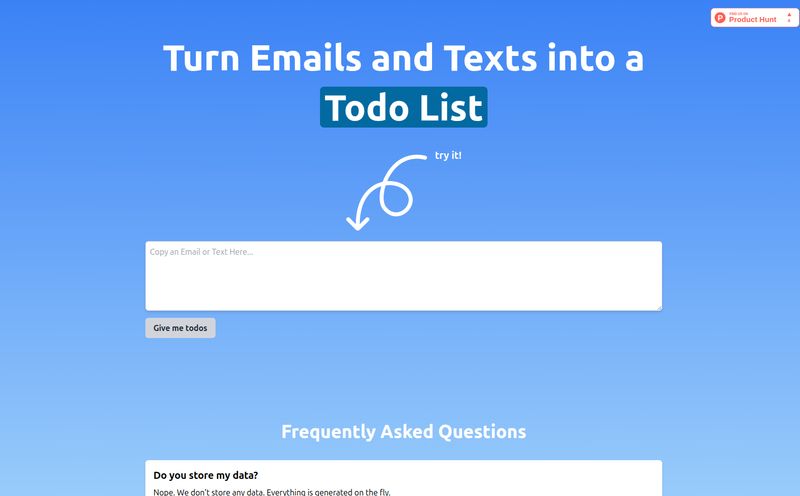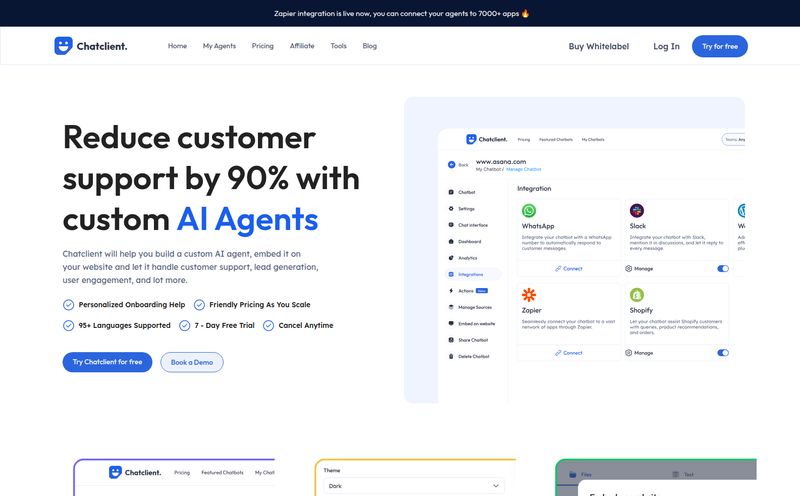As someone who's been swimming in the SEO and team management waters for years, I've seen a parade of tools promising to 'revolutionize' teamwork. Most of them are just glorified to-do lists or another chat app we have to keep open. They're usually more noise than signal.
So, when I first heard about Marlee, an AI platform designed to be a personal coach for your entire team, my skepticism meter went up. Another piece of tech that promises to solve the messy, wonderfully complex human parts of work? Yeah, right.
But then I looked closer. It's not just about tracking tasks. It's about understanding people. The motivations, the communication quirks, the things that make one person thrive and another one grind their teeth. And honestly, that got my attention. Because at the end of the day, that’s the secret sauce to any high-performing team, isnt it?

Visit Marlee
So What Is Marlee, Exactly?
Think of Marlee as a translator for your team. It’s an AI-powered platform that helps you understand the 'why' behind how your colleagues work. You know that brilliant developer who’s terrible at email? Or the marketing lead who needs constant feedback to do their best work? Marlee is designed to decode those tendencies.
It works by getting each team member to answer some questions about their work style, motivations, and goals. The AI then crunches this data to provide personalized insights and coaching. It’s not about putting people in a box like some old-school personality test; it’s about creating a user manual for each person, helping everyone else learn how to connect and collaborate with them more effectively. It’s like having a team psychologist on retainer, but one that lives right inside your workflow.
How Marlee Gets to Know Your Team
The process is surprisingly straightforward, which I appreciate. No one has time for a complicated onboarding process.
- You share what motivates you. First, you and your team answer a series of questions. This is the foundation. It’s crucial to be honest here, otherwise the whole thing is a bit pointless. It’s the classic ‘garbage in, garbage out’ principle.
- You get powerful insights. The AI takes your answers and serves up some genuinely interesting observations about your work style. I’ve always known I’m a big-picture thinker, but seeing it broken down into actionable data was...illuminating.
- You invite your team. This is where the magic happens. You share these insights, and suddenly you have a common language to talk about your different work styles. It stops being “Why is Dave so annoying in meetings?” and becomes “Oh, Dave is a detail-oriented person, I need to present him with data, not just ideas.” A small shift, but it makes a world of difference.
It's a simple loop, but one that's designed to build on itself over time.
The Standout Features That Matter
Okay, let's get into the nitty-gritty. A lot of platforms are all sizzle and no steak. I poked around to see what Marlee is actually serving up.
Personalized AI Coaching That's Actually Personal
This isn't just a daily horoscope for your work life. Marlee provides specific, scalable coaching based on your unique profile. For instance, it might give a manager tips on how to best deliver feedback to a specific team member who dislikes direct confrontation, suggesting they frame it around shared goals. It’s proactive, not just reactive, and that’s a big win in my book.
Resolving Conflict Before It Starts
I once worked on a project that nearly imploded because two key team members just could not get on the same page. It was a communication nightmare. Marlee’s conflict resolution support is designed to prevent exactly that. By highlighting communication style differences and potential friction points ahead of time, it gives teams the tools to talk through issues constructively. It won't solve everything, but it gives you a fighting chance.
Better Hiring and Talent Development
This is a big one. You can use Marlee's framework to better identify what makes top performers in your company tick. During talent acquisition, this can help you find candidates who don't just have the right skills, but also the right motivational DNA to thrive in your culture. It's also fantastic for development, helping you groom future leaders by understanding what truly drives them.
Let's Talk Money: The Marlee Pricing Breakdown
Alright, the all-important question: what’s this going to cost? The pricing structure is actually quite sensible and scales with your needs. It’s not one-size-fits-all, which is smart.
| Plan | Price | Best For |
|---|---|---|
| Starter | Free, Forever | Individuals and small teams just getting their feet wet. A great way to try it out. |
| Growth | $15.99 /user/month | Growing teams that need deeper insights, historical data, and more advanced tools. |
| Enterprise | Custom (Contact Sales) | Large organizations needing SSO, a dedicated success manager, and custom configurations. |
The free plan is genuinely useful. You're not just getting a useless teaser. For an individual or a tiny team, it's a fantastic starting point to understand the core concepts. But the real power for a business is going to be in the Growth and Enterprise tiers.
My Honest Take: The Good and The Not-So-Good
No tool is perfect. Marlee is impressive, but it's not a magic wand. Based on its own mechanics and my experience, here's my breakdown.
The good stuff is pretty obvious. It's built on a data-backed approach, which appeals to the analyst in me. The focus on personalized, actionable insights is miles ahead of generic team-building fluff. It tackles real, painful problems like communication breakdowns and poor collaboration. Plus, seeing logos like Google and Microsoft on their site lends some serious credibility.
On the flip side, its effectiveness is entirely dependent on team buy-in. If your team members rush through the initial questions or aren’t honest, the insights will be weak. It requires a certain level of maturity and a genuine desire from the team to want to improve. It's a tool, not a cure. You still have to do the work.
Frequently Asked Questions about Marlee
I can already hear the questions bubbling up, so let's tackle a few common ones.
Who is Marlee best for?
I'd say Marlee is ideal for teams that are already good but want to be great. It's for managers who are tired of guessing and want a data-informed way to lead. It's also amazing for newly-formed teams or companies going through big changes, like a merger or a rapid growth spurt, where understanding each other quickly is critical.
Is Marlee just another personality test like Myers-Briggs?
Not really. While it does involve self-assessment, it's less about putting you in one of 16 boxes and more about creating a dynamic, practical guide to your work preferences. The focus is on how to collaborate with others, not just on defining your type. It’s more actionable and less academic.
Can I use Marlee by myself?
Yes, and the free plan is perfect for this. Getting personal insights into your own motivations and work style is valuable on its own. It can help you understand why you thrive in certain environments and struggle in others. Of course, its true power is unleashed when you use it with a team.
How does Marlee handle our data privacy?
This is a big one for any AI tool. Marlee's entire model is built on trust, so they take security and privacy seriously. For specifics, especially for enterprise needs, you'd want to check their latest privacy policy and talk to their team, but platforms that land clients like KPMG and L'Oreal usually have their security ducks in a row.
How much time does it take to get started?
The initial setup—answering the questions—is pretty quick. The real 'work' is ongoing. It's about reading the insights, trying out the coaching suggestions in your daily interactions, and having conversations with your team. It's a low-effort, high-impact tool that integrates into your week rather than adding another huge task to it.
Final Thoughts: Is Marlee Worth It?
After digging in, I have to admit my initial skepticism has faded. Marlee isn't just another shiny object. It’s a thoughtful, well-designed tool that addresses a fundamental challenge of modern work: how to get a group of unique, brilliant, and sometimes frustrating individuals to perform as a cohesive unit.
Is it a silver bullet that will instantly solve all your team problems? Of course not. But it’s a powerful new kind of compass. It can guide your conversations, inform your leadership, and help you build a team that doesn't just work together, but genuinely brings out the best in each other. And in today’s world, that’s an advantage I wouldn't underestimate.



